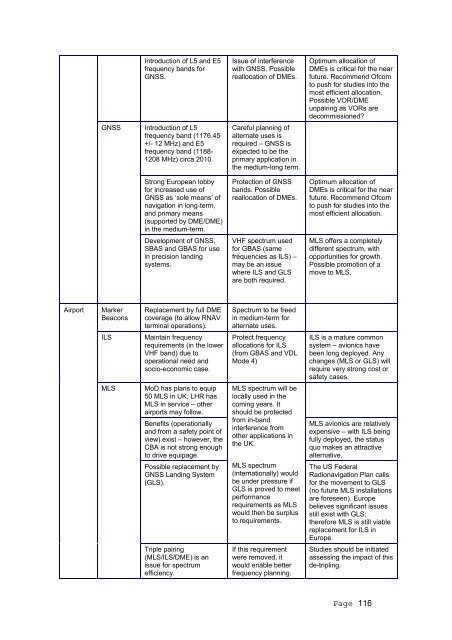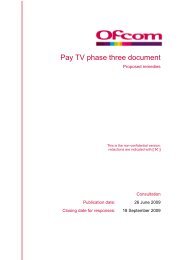FINAL REPORT - Stakeholders - Ofcom
FINAL REPORT - Stakeholders - Ofcom
FINAL REPORT - Stakeholders - Ofcom
Create successful ePaper yourself
Turn your PDF publications into a flip-book with our unique Google optimized e-Paper software.
Airport<br />
GNSS<br />
Marker<br />
Beacons<br />
Introduction of L5 and E5<br />
frequency bands for<br />
GNSS.<br />
Introduction of L5<br />
frequency band (1176.45<br />
+/- 12 MHz) and E5<br />
frequency band (1188-<br />
1208 MHz) circa 2010<br />
Strong European lobby<br />
for increased use of<br />
GNSS as ‘sole means’ of<br />
navigation in long-term,<br />
and primary means<br />
(supported by DME/DME)<br />
in the medium-term.<br />
Development of GNSS,<br />
SBAS and GBAS for use<br />
in precision landing<br />
systems.<br />
Replacement by full DME<br />
coverage (to allow RNAV<br />
terminal operations).<br />
ILS Maintain frequency<br />
requirements (in the lower<br />
VHF band) due to<br />
operational need and<br />
socio-economic case.<br />
MLS<br />
MoD has plans to equip<br />
50 MLS in UK; LHR has<br />
MLS in service – other<br />
airports may follow.<br />
Benefits (operationally<br />
and from a safety point of<br />
view) exist – however, the<br />
CBA is not strong enough<br />
to drive equipage.<br />
Possible replacement by<br />
GNSS Landing System<br />
(GLS).<br />
Triple pairing<br />
(MLS/ILS/DME) is an<br />
issue for spectrum<br />
efficiency.<br />
Issue of interference<br />
with GNSS. Possible<br />
reallocation of DMEs.<br />
Careful planning of<br />
alternate uses is<br />
required – GNSS is<br />
expected to be the<br />
primary application in<br />
the medium-long term.<br />
Protection of GNSS<br />
bands. Possible<br />
reallocation of DMEs.<br />
VHF spectrum used<br />
for GBAS (same<br />
frequencies as ILS) –<br />
may be an issue<br />
where ILS and GLS<br />
are both required.<br />
Spectrum to be freed<br />
in medium-term for<br />
alternate uses.<br />
Protect frequency<br />
allocations for ILS<br />
(from GBAS and VDL<br />
Mode 4)<br />
MLS spectrum will be<br />
locally used in the<br />
coming years. It<br />
should be protected<br />
from in-band<br />
interference from<br />
other applications in<br />
the UK.<br />
MLS spectrum<br />
(internationally) would<br />
be under pressure if<br />
GLS is proved to meet<br />
performance<br />
requirements as MLS<br />
would then be surplus<br />
to requirements.<br />
If this requirement<br />
were removed, it<br />
would enable better<br />
frequency planning.<br />
Optimum allocation of<br />
DMEs is critical for the near<br />
future. Recommend <strong>Ofcom</strong><br />
to push for studies into the<br />
most efficient allocation.<br />
Possible VOR/DME<br />
unpairing as VORs are<br />
decommissioned?<br />
Optimum allocation of<br />
DMEs is critical for the near<br />
future. Recommend <strong>Ofcom</strong><br />
to push for studies into the<br />
most efficient allocation.<br />
MLS offers a completely<br />
different spectrum, with<br />
opportunities for growth.<br />
Possible promotion of a<br />
move to MLS.<br />
ILS is a mature common<br />
system – avionics have<br />
been long deployed. Any<br />
changes (MLS or GLS) will<br />
require very strong cost or<br />
safety cases.<br />
MLS avionics are relatively<br />
expensive – with ILS being<br />
fully deployed, the status<br />
quo makes an attractive<br />
alternative.<br />
The US Federal<br />
Radionavigation Plan calls<br />
for the movement to GLS<br />
(no future MLS installations<br />
are foreseen). Europe<br />
believes significant issues<br />
still exist with GLS;<br />
therefore MLS is still viable<br />
replacement for ILS in<br />
Europe.<br />
Studies should be initiated<br />
assessing the impact of this<br />
de-tripling.<br />
Page 116
















